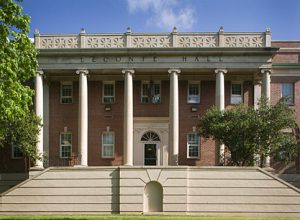Founded in 1803, the Demosthenian Literary Society is a student run organization that focuses on the value of debate and intellectual discussion. Forced to meet in classrooms during their initial years, students and alumni raised money to fund the construction of Demosthenian Hall in 1824, giving the society a permanent home on campus. Describing this new addition to campus, the Athenian describes the hall as a “handsome Brick Building, with a beautiful hall…in a flourishing condition”(April 18, 1828). Advertising anniversary celebrations and debates in the local paper, the Demosthenian Society appears to have been very active in the college community, frequently engaging in debate with the Phi Kappa Society, a rival literary society on campus. In the years prior to the Civil War, however, the tone of these advertisements begins to change. Published in the Southern Watchman on July 12th, 1860, a note is addressed to the “Gentlemen of the Demosthenian and Phi Kappa Societies,” emphasizing the importance of state pride and patriotism, calling on these young men to “struggle ever for her rights” and to “shed the last drop of your blood rejoicing, to defend her honor and protect her homes,” wishing them “a happy victory or else a glorious grave.” A particularly notable member of the Demosthenian Society was Robert Toombs, who would later become a founding member of the Confederacy, serving as Secretary of State under Jefferson Davis (Reed, 296). While the society’s website includes his name among those they consider notable members, there is no real acknowledgment concerning his role as a founding member of the Confederacy.
Resources:
Demosthenian Literary Society at The University of Georgia, “The Hall,” http://www.dlsuga.com/
Athens Historic Newspaper Archive, http://athnewspapers.galileo.usg.edu/athnewspapers-j2k/search
Reed, Thomas Walter. History of The University of Georgia (unpublished typescript). 1946. http://dlg.galileo.usg.edu/reed/


